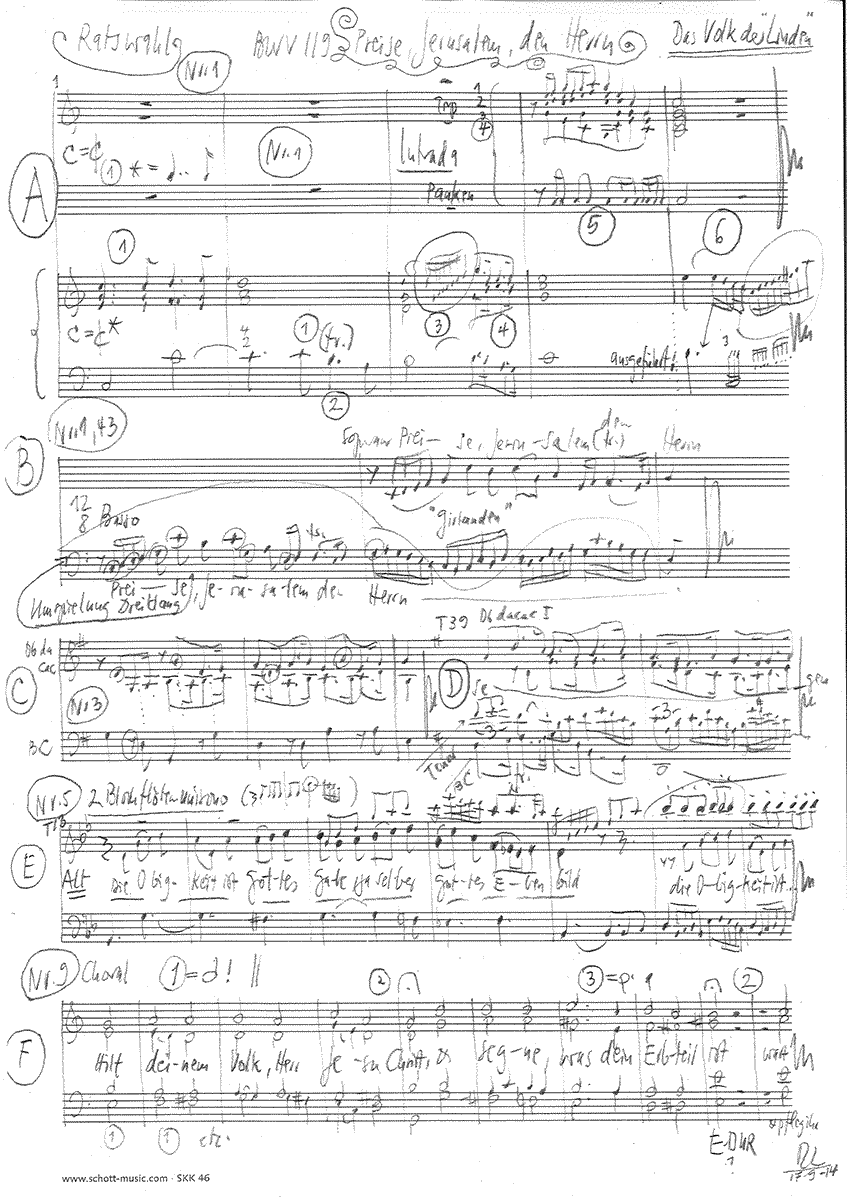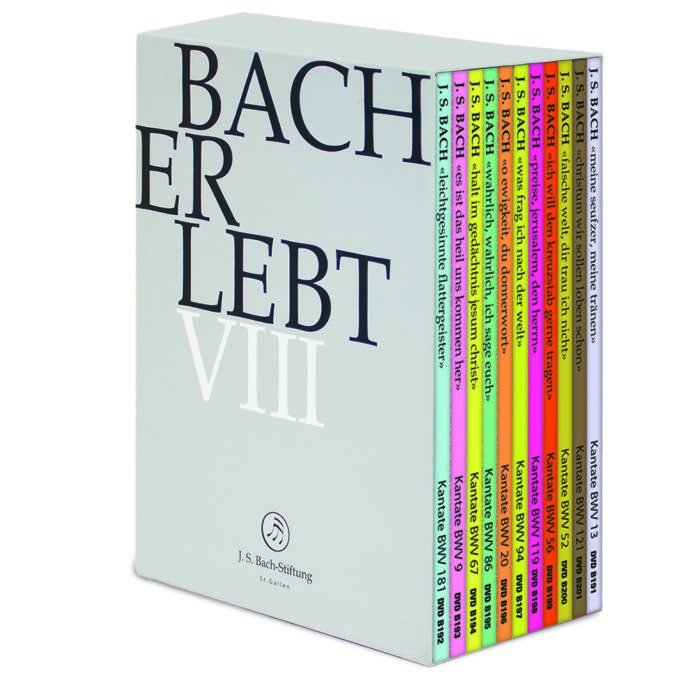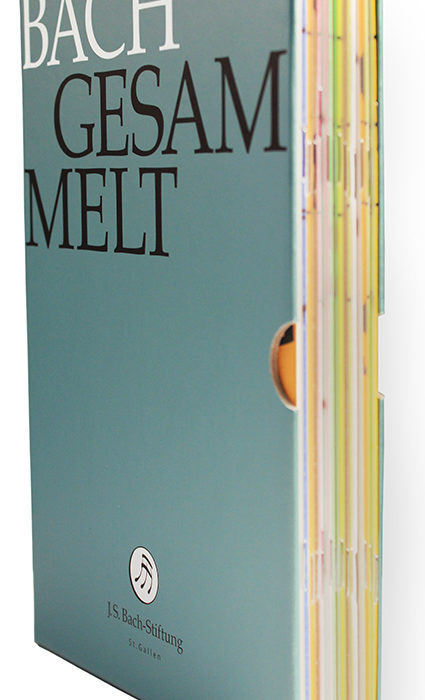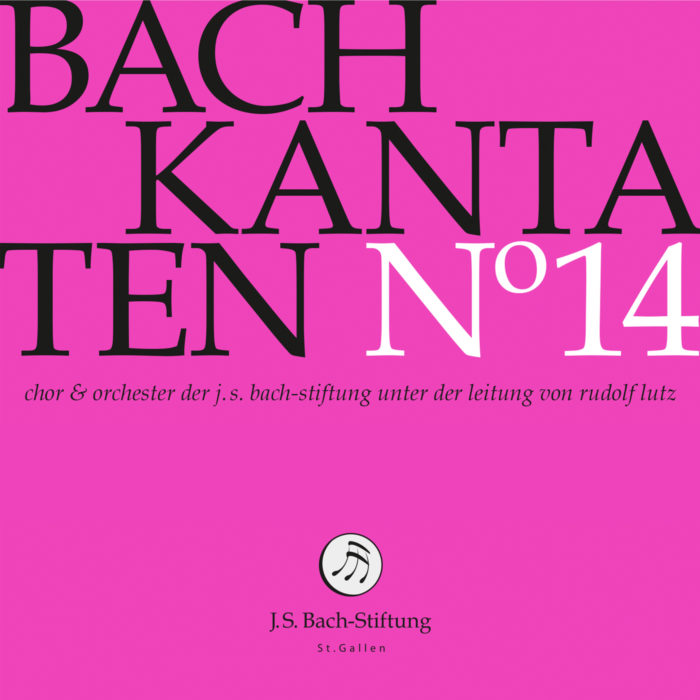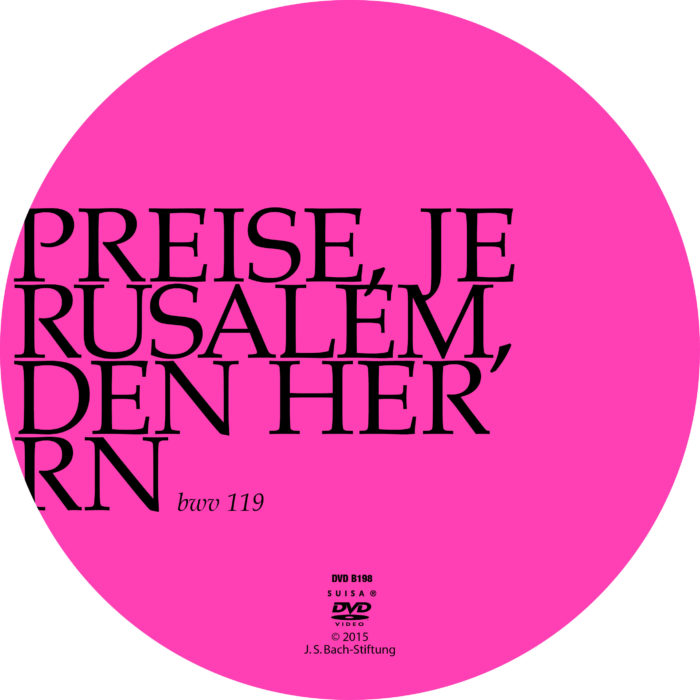Preise, Jerusalem, den Herrn
BWV 119 // For the Council Election
(Praise, O Jerusalem, the Lord) for soprano, alto, tenor and bass, vocal ensemble, trumpets I-IV, timpani, flauto dolce I+II, oboe I-III, oboe d’ amore I+II, strings and basso continuo
When Bach commenced his position as Thomas Cantor in 1723, he was, despite a long selection process with many rival candidates, the great hope of an influential council faction intent on introducing a courtly aspect to the music of Leipzig. One opportunity for Bach to show that their trust and goodwill were not misplaced was the council election service. Taking place annually on St Bartholomew’s Day in Leipzig’s St Nicolas Church, these proceedings represented an act of political folklore that elevated the formal rotation between an active and two inactive council associations to a pseudo-democratic rebirth rooted in theocratic legitimation.
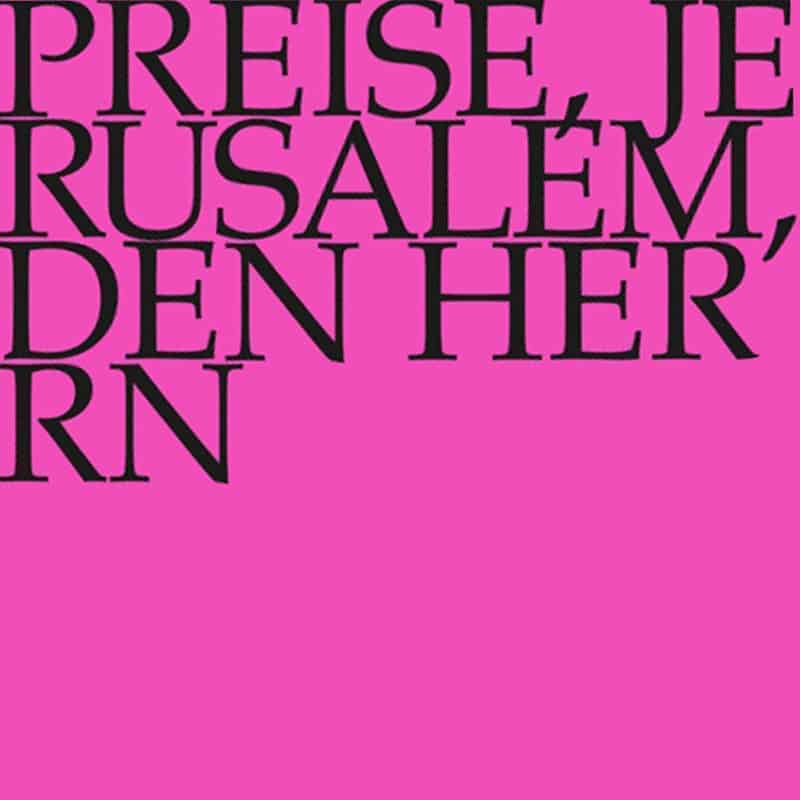
Would you like to enjoy our videos ad-free? Subscribe to YouTube Premium now...
Workshop
Reflective lecture
Bonus material
Choir
Soprano
Lia Andres, Guro Hjemli, Jennifer Rudin, Noëmi Sohn Nad, Noëmi Tran Rediger, Alexa Vogel, Maria Weber
Alto
Jan Börner, Antonia Frey, Francisca Näf, Damaris Rickhaus, Simon Savoy, Lea Scherer
Tenor
Marcel Fässler, Clemens Flämig, Manuel Gerber, Walter Siegel
Bass
Fabrice Hayoz, Valentin Parli, Philippe Rayot, Oliver Rudin, Tobias Wicky, William Wood
Orchestra
Conductor
Rudolf Lutz
Violin
Renate Steinmann, Monika Baer, Sabine Hochstrasser, Martin Korrodi, Ildiko Sajgo, Olivia Schenkel, Salome Zimmermann, Anita Zeller
Viola
Susanna Hefti, Matthias Jäggi, Ulrike Kaufmann
Violoncello
Martin Zeller, Hristo Kouzmanov
Violone
Iris Finkbeiner
Oboe
Kerstin Kramp, Andreas Helm, Ann Cathrin Collin
Bassoon
Susann Landert
Tromba da tirarsi
Patrick Henrichs, Peter Hasel, Klaus Pfeiffer, Pavel Janecek
Recorder/Flute
Annina Stahlberger, Teresa Hackel
Timpani
Martin Homann
Organ
Nicola Cumer
Harpsichord
Thomas Leininger
Musical director & conductor
Rudolf Lutz
Workshop
Participants
Karl Graf, Rudolf Lutz
Reflective lecture
Speaker
Josef Estermann
Recording & editing
Recording date
09/19/2014
Recording location
Church of St. Peter, Zurich
Sound engineer
Stefan Ritzenthaler
Director
Meinrad Keel
Production manager
Johannes Widmer
Production
GALLUS MEDIA AG, Switzerland
Producer
J.S. Bach Foundation of St. Gallen, Switzerland
Librettist
Text No. 1
Ps. 147:12–14
Text No. 9
Martin Luther, 1529
First performance
Inauguration of the New Town Council,
30 August 1723, Leipzig
In-depth analysis
For this special event, Bach was always paid an additional sum to compose a festive work, one that aptly reflected a balance between veneration of authority worthy of the Old Testament, and everyday city life – including a nod to the Saxon dialect of the time.
And Bach did not disappoint his superiors: with the splendid overture in the introductory chorus of cantata BWV 119 (opulently scored for four trumpets, timpani, two recorders, three oboes, strings, four-part choir and basso continuo) the baroque master presented a composition of truly regal character. The middle section then weaves the psalm text line for line into a score of alternating fugue-like passages, block-like calls and sparsely voiced episodes. Underpinned throughout by a driving continuo line, the section distinctly embodies an expansive gesture of blessing for the “children of Jerusalem” and thus by proxy for the city’s subjects.
The tenor recitative praises the “blessed city” of Leipzig, which is envisioned as the Lord’s chosen dwelling place and therefore a community governed by divine rule. Through its reference to the words of the Psalm, “where righteousness and peace kiss”, an ideal of citizenry is proffered that may well have raised a knowing smile from some in the audience…
The tenor aria expands the concept of this sheltered life under wise rulers to an idyll of great comfort: “Well thee, thou linden people, Well thee, thou art well off”. Enveloped in the hauntingly beautiful sound of two oboe da caccia and gentle, dotted rhythms, the traditional figure of the apolitical “Saxon Michel” could readily surrender to the blessed repose of the justly ruled and light his tobacco pipe in peace…
The bass recitative, by contrast, calls to the fore the majestic aura of the city’s government. By contrasting praise of authority with faithful gratitude to the heavenly father through an abrupt change in voicing and key, Bach skilfully raises the extended accompagnato to a masterly orchestrated reflection of virtue.
This section is followed by an astonishing aria that is virtually unrivalled in the realm of baroque musical symbolism. While the text “Authority is God’s endowment, indeed, of God an image true” seems predestined for bass voice and powerful wind parts, Bach foils these expectations so thoroughly (solo alto and two unison recorders!) that one must assume he was consciously flaunting the rules. Indeed, the result is a musical portrayal of transience in which the derisive laughter of the recorders mirrors the puffed-up nature of the city councillors’ temporary and mortal rule. A good Lutheran and well versed in the bible, Bach differentiated clearly between token deference paid to the authorities and the true humility that behoves all children of God.
Accordingly, the soprano recitative expounds on the burdens of office, ere great rejoicing breaks forth: in an expansive concerto chorus for four voices and poly-choral orchestral tutti, the acclamation of the collected citizenry is musically re-enacted, while communal tradition (the sage, patrician fugue theme) and trade-town finesse are united in such a way as to show Bach at the height of his compositional powers.
Following this triumphal procession, a sparsely accompanied soprano recitative reiterates the beseeching entreaty that Leipzig’s citizens may continue to receive the undeserved blessing of being children of God.
This attitude of a “humble prayer” would seem to correspond perfectly to the plain closing chorale of the score, but since the performance parts are lost, we cannot know whether Bach intended the vocal parts to be doubled by the orchestra. The many pauses and fermatas in the score present an additional mystery. Did the composer expressly wish a “still” music and a gesture of blessing as suggested by the text? Or should the “gaps” be animated with fanfare, as typical of many of his closing chorales and the Christmas oratorio? We have thus recorded two versions: one that reflects the unadorned score, and a second with lively wind parts, composed by Thomas Leininger, that refute the apparent awkwardness of the key.
Libretto
1. Chor
Preise, Jerusalem, den Herrn,
lobe, Zion, deinen Gott;
denn er machet fest die Riegel deiner Tore
und segnet deine Kinder drinnen,
er schaffet deinen Grenzen Friede.
2. Rezitativ (Tenor)
Gesegnet Land! glückselge Stadt!
wo selbst der Herr sein Herd und Feuer hat.
Wie kann Gott besser lohnen,
als wo er Ehre läßt in einem Lande wohnen;
wie kann er eine Stadt
mit reichern Nachdruck segnen,
als wo er Güt und Treu einander läßt begegnen.
Wo er Gerechtigkeit und Friede
zu küssen niemals müde,
nicht müde, niemals satt
zu werden teuer verheißen,
auch in der Tat erfüllet hat,
da ist der Schluß gemacht:
Gesegnet Land! glückselge Stadt!
3. Arie (Tenor)
Wohl dir, du Volk der Linden,
wohl dir, du hast es gut,
wie viel an Gottes Segen
und seiner Huld gelegen,
die überschwenglich tut,
kannst du an dir befinden.
4. Rezitativ (Bass)
So herrlich stehst du, liebe Stadt!
Du Volk! das Gott zum Erbteil sich erwählet hat.
Doch wohl! und aber wohl!
wo man’s zu Herzen fassen
und recht erkennen will, durch wen der Herr
den Segen wachsen lassen.
Ja! was bedarf es viel, das Zeugnis ist schon da,
Herz und Gewissen wird uns überzeugen,
daß, was wir Gutes bei uns sehn,
nächst Gott durch kluge Obrigkeit
und durch ihr weises Regiment geschehn.
Drum sei, geliebtes Volk, zu treuem Dank bereit,
sonst würden auch davon nicht deine
Mauren* schweigen.
*Mauern
5. Arie (Alt)
Die Obrigkeit ist Gottes Gabe,
ja selber Gottes Ebenbild.
Wer ihre Macht nicht will ermessen,
der muß auch Gottes gar vergessen,
wie würde sonst sein Wort erfüllt.
6. Rezitativ (Sopran)
Nun! wir erkennen es und bringen dir,
o höchster Gott, ein Opfer unsers Danks dafür.
Zumal, nachdem der heutge Tag,
der Tag, den uns der Herr gemacht,
euch, teure Väter, teils von eurer Last entbunden,
teils auch auf euch schlaflose Sorgenstunden
bei einer neuen Wahl gebracht,
so seufzt ein treues Volk mit Herz und Mund zugleich:
7. Chor
Der Herr hat Guts an uns getan,
des sind wir alle fröhlich.
Er seh die teuren Väter an
und halte auf unzählig
und späte, lange Jahre ’naus
in ihren Regimente Haus,
so wollen wir ihn preisen.
8. Rezitativ (Alt)
Zuletzt! Da du uns, Herr,
zu deinem Volk gesetzt,
so laß von deinen Frommen
nur noch ein arm Gebet
vor deine Ohren kommen;
und höre! ja, erhöre,
der Mund, das Herz und Seele seufzet sehre.
9. Choral
Hilf deinem Volk, Herr Jesu Christ,
und segne, was dein Erbteil ist,
wart und pfleg ihr’r zu aller Zeit
und heb sie hoch in Ewigkeit. Amen.
Bonus material
9. Choral mit Blästerbesetzung (nachkomponiert von Thomas Leiniger)
Hilf deinem Volk, Herr Jesu Christ,
und segne, was dein Erbteil ist,
wart und pfleg ihr’r zu aller Zeit
und heb sie hoch in Ewigkeit. Amen.



